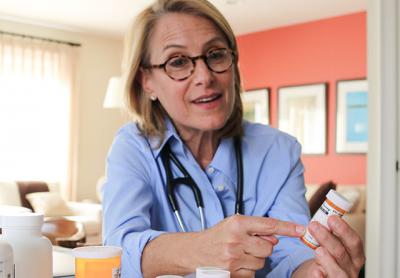They’re Reviving the House Call

At a time when medical coverage has become increasingly complicated and uncertain, one local doctor’s office is making access to care a priority. In the past year, Dr. George Dempsey, a family physician who heads up East Hampton Family Medicine on Pantigo Road in East Hampton, launched an in-home care initiative as part of a larger effort to reach underserved members of the community.
This service, spearheaded by Diane Schade, a nurse-practitioner, harks back to a bygone era in family medicine, offering house calls to patients who are unable to make it into the office. Ms. Schade, who is trained as an adult geriatric palliative nurse-practitioner, can provide critical medical care all in the comfort of patients’ own homes. Her visits can include physical examinations, laboratory and diagnostic services, treatment and medication management, and palliative care.
This service, which is currently covered under Medicare, is available to anyone who is homebound or for whom getting into the office poses a serious challenge. While at-home treatment options certainly benefit physically handicapped patients, they are not the only group that Ms. Schade sees. Patients may be homebound for a variety of reasons related to age, physical mobility, living conditions, driving ability, psychological state, or recent hospitalization. Anyone who is unable to get into the office qualifies for home care. Approximately 33 percent of Dr. Dempsey’s patients receive Medicare, and a small number of them also qualify for home care. For those who do qualify, the service can be a lifesaver.
Here on the South Fork, where houses are relatively spread out and public transportation is limited, concerns about access to medical care can be as literal as they are financial. For some, the task of getting into the doctor’s office (which may require a companion, a wheelchair or walker, and a means of transportation) can be onerous, if not prohibitive. Many of the patients Ms. Schade sees at home were once regular patients in Dr. Dempsey’s office, some of whom suffered injuries that impaired their mobility or simply became too sick to leave the house. This left them to rely on emergency services, expensive in-home aides, or to forgo professional medical attention altogether.
In the current health care environment, providers rarely have the resources to follow up with patients stop making appointments. The difficult reality is that patients with critical conditions often end up falling through the cracks. Dr. Dempsey’s new initiative hopes to address that and to ensure a second line of defense against patients being left behind. He is adamant that “Just because they can’t get into the office, doesn’t mean they’re not my patients anymore,” he said.
Beyond the logistics, many providers believe that house calls can have auxiliary benefits on quality of care and doctor-patient relations. In-home treatment presents the opportunity for a more individualized, patient-focused model of care. Under these conditions, patients’ lifestyles and personal priorities can be better taken into account.
“Seeing someone in their home allows you access to critical firsthand information that you just can’t get in an office,” Ms. Schade said. “For instance, you get to see how [the patients] are living, what they eat, what drugs they’re taking, and better assess what their day-to-day needs are. All of that information is valuable from a clinical perspective and helps me determine the best course of treatment.”
While other doctors in the area may dedicate a portion of their schedule to in-home visits, so far East Hampton Family Medicine is the first practice here to have one provider devoted exclusively to house calls. “He has always been ahead of the curve,” Ms. Schade says of Dr. Dempsey, whom she met while working to develop the palliative care service at Stony Brook Southampton Hospital.
Their hope is that this initiative might serve as a model for other providers. With approximately 250,000 Medicare recipients living in Suffolk County, house-call programs would have the potential to benefit thousands of people, if they catch on. Indeed the initiative has gotten the attention of local government officials, who may be interested in expanding on programs like this.
Dr. Dempsey recently met with East Hampton Village Mayor Paul F. Rickenbach Jr., who was impressed with the success of the home-care program.
Beyond providing house calls, Dr. Dempsey’s office has made several other changes to increase accessibility to care, including launching a comprehensive women’s health care service. Based in the East Hampton office, Julia Chachere, a certified nurse-midwife and women’s health nurse-practitioner, provides well-woman exams, birth control services, and treats gynecological problems. With a large bilingual staff, including Ms. Chachere, the office has also made an effort to ensure that Spanish-speaking patients, an ever growing demographic, feel comfortable. The office also employs two social workers, and a full-time advocate for Medicaid patients to ensure they receive the services they need.
The national health care landscape has seen many shifts over the last year, with providers and patients scrambling to keep up with policy changes. The Trump administration’s recent threats to privatize Medicare have caused widespread uncertainty about coverage.
Although Ms. Schade is currently the only dedicated home care nurse-practitioner in Suffolk County, she is optimistic that programs like this will catch on. “I’m sure one day all primary care practices will be doing this. It’s health care at its best.”
